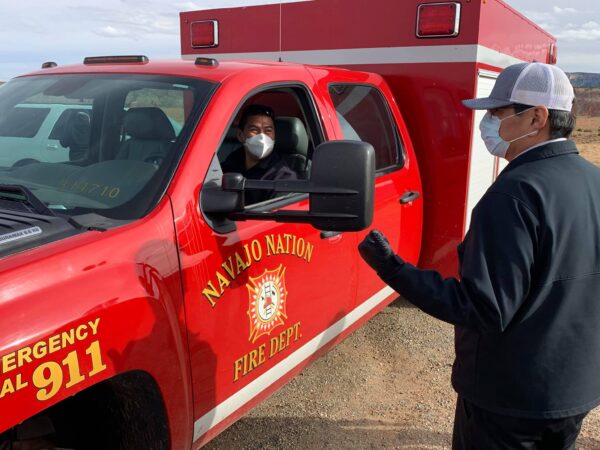
- Details
- By Levi Rickert
WINDOW ROCK, Ariz. — The Navajo Department of Health, in coordination with the Navajo Epidemiology Center, Navajo Area Indian Health Service, and the Tribal Health Organizations reported 69 new cases of COVID-19 for the Navajo Nation on Monday night. The total number of positive COVID-19 cases for the Navajo Nation has reached 4,071 and the total number of deaths is now 142. In addition, there have been 928 recoveries.
A total of 25,682 COVID-19 tests have been administered with 19,964 negative results.
“The Navajo Nation is testing our citizens at a greater rate per capita than any state in the entire country and that’s a major reason why we have high numbers of positive cases. The Navajo Nation must continue to work together with local, state, and federal partners to stop the spread of COVID-19 by staying home, washing hands, staying at least six-feet apart from others, and by wearing proper personal protection, such as face masks when in public,” Navajo Nation President Jonathan Nez said. “The number of recoveries is increasing, and that gives us hope and strength to keep moving forward. As Navajo people, we have overcome many adversities and we will overcome this as well.”
The Navajo Nation continues to conduct large-scale testing of its residents to help identify and isolate those who are positive. Three Alternative Care Sites are currently being used in Gallup, Shiprock, and Chinle to isolate positive COVID-19 individuals to prevent the spread of the virus.
On Tuesday, the Tuba City Regional Health Care Corporation will have a COVID-19 testing site at the Tonalea Chapter House parking lot from 8:00 a.m. to 1:00 p.m. for those showing COVID-19 symptoms, those who have been exposed to COVID-19, and those who think they may have the virus, but are not showing symptoms. The general public is asked to wear a protective mask and remain in your vehicle at all times.
For more information including reports, helpful prevention tips, and more resources, please visit the Navajo Department of Health’s COVID-19 website at http://www.ndoh.navajo-nsn.gov/COVID-19. To contact the main Navajo Health Command Operations Center, please call (928) 871-7014.
_________________________________________________________________
To Donate to the Navajo Nation
The official webpage for donations to the Navajo Nation, which has further details on how to support the Nation’s Dikos Ntsaaígíí-19 (COVID-19) efforts is: http://www.nndoh.org/donate.html.
_________________________________________________________________
For More Information
For more information including reports, helpful prevention tips, and more resources, please visit the Navajo Department of Health’s COVID-19 website at http://www.ndoh.navajo-nsn.
For up to date information on impact the coronavirus pandemic is having in the United States and around the world go to: https://www.worldometers.info/coronavirus/country/us/?fbclid=IwAR1vxfcHfMBnmTFm6hBICQcdbV5aRnMimeP3hVYHdlxJtFWdKF80VV8iHgE
For up-to-date information about COVID-19, Native News Online encourages you to go to Indian Health Service’s COVID-19 webpage and review CDC’s COVID-19 webpage.
More Stories Like This
Native News Weekly (August 25, 2024): D.C. BriefsUS Presidents in Their Own Words Concerning American Indians
Two Murdered on Colville Indian Reservation
NDAA passes House; Lumbee Fairness Act Advances
NFL, Vikings to Host Native All-American Game, Youth Flag Clinic
Help us defend tribal sovereignty.
At Native News Online, our mission is rooted in telling the stories that strengthen sovereignty and uplift Indigenous voices — not just at year’s end, but every single day.
Because of your generosity last year, we were able to keep our reporters on the ground in tribal communities, at national gatherings and in the halls of Congress — covering the issues that matter most to Indian Country: sovereignty, culture, education, health and economic opportunity.
That support sustained us through a tough year in 2025. Now, as we look to the year ahead, we need your help right now to ensure warrior journalism remains strong — reporting that defends tribal sovereignty, amplifies Native truth, and holds power accountable.
 The stakes couldn't be higher. Your support keeps Native voices heard, Native stories told and Native sovereignty defended.
The stakes couldn't be higher. Your support keeps Native voices heard, Native stories told and Native sovereignty defended.
Stand with Warrior Journalism today.
Levi Rickert (Potawatomi), Editor & Publisher

